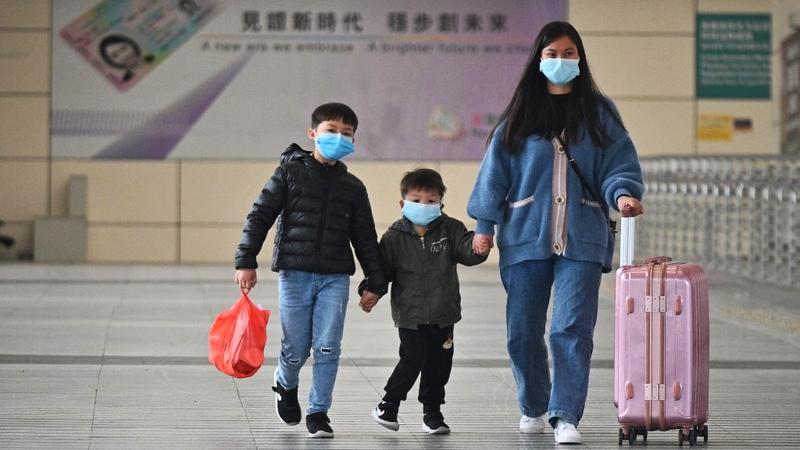Hong Kong bids to resume travel with mainland China

People wearing facemasks as a preventative measure following a coronavirus outbreak walk at Shenzhen Bay Port Hong Kong Port Area on Feb 8, 2020. AFP
HONG KONG — The Hong Kong Special Administrative Region government is gearing up for a reopening of the border with the Chinese mainland, with detailed plans to launch a virus test booking system at checkpoints, and to update the city’s LeaveHomeSafe application to operate on a real-name registration basis and with a risk-identified color-coded health system.
Revealing the plans amid a tight anti-pandemic schedule, newly inaugurated Hong Kong Secretary for Health Lo Chung-mau said the new-term government will expedite the resumption of quarantine-free cross-boundary travel and earnestly address people’s concerns in the ongoing COVID-19 fight.
At a media session on Monday, Lo said that anyone undergoing home quarantine from Friday will be required to wear electronic wristbands to confirm their presence at home.
In addition, the government is considering optimizing the LeaveHomeSafe app, including requiring all users to register with their real names, and launching a health code system.
The initial idea is that those who test positive will be issued a “red code” and those who are undergo ing quarantine — especially those returning to Hong Kong from overseas — will be issued a “yellow code”, Lo revealed.
Article continues after this advertisementLo stressed the need for those with the “red code” to stay at home, adding that those with the “yellow code” will not be prevented from using public transportation.
Article continues after this advertisementHo Pak-leung, president of the Centre for Infection at the University of Hong Kong, said that the health code will help control the pandemic more precisely.
To enable the health code system to better identify those at high risk, Ho suggested that the authorities speed up the release of COVID-19 test results, by targeting a goal of within 24 hours. He said that the number of confirmed cases has yet to peak. With the rapid spread of omicron subvariants BA.4 and BA.5 in the world, the number of local infections is likely to double one or two weeks from now, Ho said.
Eric Yeung Chuen-sing, founder and honorary president of the Smart City Consortium, said introducing real-name registration and a health code system on the LeaveHomeSafe app does not necessarily mean that the app can track users’ movements.
He suggested that the government allow users to choose whether to turn on the tracking function of the app to reduce their concerns. Yeung added that the privacy issue should not arouse much concern as many commonly used applications already have similar functions.
Besides, to reduce northbound residents’ waiting time for virus tests at the Shenzhen Bay Port, Lo told a Monday radio program that the government aims to launch a booking system for people to take the virus tests early this week. Since the Shenzhen government increased the quarantine hotel quota for arrivals coming via the port to 2,000 per day early this month, the checkpoint has seen crowds waiting to do the free virus tests offered by the Hong Kong SAR government, which is essential before they can pass through the checkpoint.
After the booking system is launched, up to 500 people are expected to pass through the port each hour, and the waiting time for each visitor will be shortened to less than two hours, Lo said.
Cecile Li, 24, a mainland student who is studying in Hong Kong, had traveled between Shenzhen and Hong Kong under the quarantine arrangement several times amid the pandemic. She said she believes that the online booking system will help shorten the waiting time and is also a necessary measure to disperse the flow of people.
As for the health code arrangement, Li said it is an essential step to control the virus transmission, which “should have been done earlier”.
RELATED STORIES
Hong Kong considers shorter COVID-19 quarantine for travelers—Lee
Hong Kong daily COVID-19 cases rise above 2,000, highest since April
Hong Kong questions costs of COVID-19 rules on mental health, livelihoods
China’s widening COVID-19 curbs threaten global supply chain paralysis
For more news about the novel coronavirus click here.
What you need to know about Coronavirus.
For more information on COVID-19, call the DOH Hotline: (02) 86517800 local 1149/1150.
The Inquirer Foundation supports our healthcare frontliners and is still accepting cash donations to be deposited at Banco de Oro (BDO) current account #007960018860 or donate through PayMaya using this link.